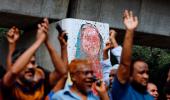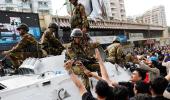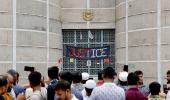'Bangladesh has become unstable and this instability will impact India.'

"It must be understood that India is not giving political shelter or political asylum to Sheikh Hasina. She requested the Indian government for time and a place to stay till she makes alternate arrangements. There is bipartisan consensus about her," says veteran journalist Gautam Lahiri.
Mr Lahiri has reported on most Bangladesh elections, visited the neighbouring country many times and has vast experience of covering Bangladesh politics.
Presently, president of the Press Club of India, he has spent nearly 40 years in journalism and specialises in South Asia.
He has interviewed ousted prime minister Sheikh Hasina several times and writes for Bangladeshi publications.
In an interview to Rediff.com's Archana Masih, Mr Lahiri speaks about the fall of Sheikh Hasina, Bangladesh's rapid descent into anarchy and the emergence of the interim government under Nobel Laureate Dr Mohammad Yunus.
What is the road ahead of Bangladesh now that the president has announced an interim government late last night?
The president of Bangladesh has announced an interim government under him. The system of the country is such that in a caretaker government, the president appoints a chief advisor under him who is the de facto prime minister.
There were internal discussions going on and a few names were floating around, but the students preferred Dr Yunus.
What would be the nature of this interim government and who will be its constituents?
The election commission statute says that once the interim government is formed a general election has to be called within three months.
Sheikh Hasina's son has said that she will no longer be in active politics, but the Awami League will be in the fray. Whether that election will be free and fair is debatable, as of now there is uncertainty and instability in Bangladesh.

In your opinion, looking at the history of Bangladesh will it be a civilian government or will it be backed by the Army?
In 2007 when there was a civilian government backed by the army, there was a law and order problem even then. Sheikh Hasina was in the Opposition at that time. She started a movement and with the intervention of the Government of India, they were forced to hold elections under the caretaker government. Sheikh Hasina swept that poll.
People say that that was the last free and fair poll in Bangladesh. Khaleda Zia, the then prime minister, had to resign. The army had taken over and installed the caretaker government.
The Bangladesh constitution has a provision for a caretaker government, but when Sheikh Hasina came to power in 2007 she abolished that provision.
She said like any other democratic country like India, the elected government will be the caretaker government, but in every election there have been allegations of malpractices.
Even now there are indications of unconstitutional actions as seen in the all-party meeting called by the army chief.
He did not invite the Left and democratic forces that were in the movement with the students, but the Jamaat and Hefazat leaders were called, the latter has a serious case lodged against him.
Some were raising questions why the Jamaat was called for the meeting because it is still a banned entity.
These questions are being raised by those who supported the student movement.
When the student leaders expressed their resentment about this, the president called the students in the evening and asked to give their nominees.
They did so and the first preference was Dr Yunus.
It took longer than usual to announce the interim government which indicates that there was some internal tug and pull because every political party wants a share of the cake, but whoever is in the government, it will not be a stable government.

What reservation would there have been against Dr Yunus, a highly respected Nobel Laureate?
It is felt that the present army chief has reservations because Dr Yusuf has a strong support of the West, especially Washington. He has won America's President's and Congressional award and, of course, the Nobel Prize. He is known to be close to Hillary Clinton and the Democratic party.
The people wanted a minus 2 formula, neither Khaleda nor Hasina.
What is your understanding of the situation in Bangladesh till yesterday? [The interim government to be headed by Nobel Laureate Dr Mohammad Yunus was announced past midnight on Tuesday night.]?
There was a vacuum. The police had withdrawn because they were being threatened and attacked. The law and order machinery had collapsed. It is mayhem and total anarchy.
Miscreants and ideologically driven extremist elements are targeting not only the Awami League leaders, but also the minorities.
The statue of Bangabandhu Sheikh Mujibur Rahman could not be broken down by the students. Islamist radicals who do not believe in statutes could be behind this desecration. It is a clear indication that forces like the Jamaat-e-Islami and other extremist forces are already in the streets.
Many extremist elements that were in prison are out on streets.

The safety of the minorities is a big concern for India. How can their safety be ensured during this time of widespread violence?
India is monitoring the situation closely and waiting for the interim government to be formed. Once the government is formed, India would send a strong message to the new government. Later on what happens is anybody's guess.
Bangladesh has become unstable and this instability will impact India, especially in the north east. The Jamaat publically proclaims that they will not allow any goods to travel through their land to the north east.
Therefore, India has a heavy stake. Bangladesh will be in a tough situation for the next three months. They have announced that there will be elections in the next three months, but no one knows if it will free and fair.
Most importantly, normalcy has to be restored. Police personnel from the Indian high commission had fled on Monday and were back yesterday, but they said they have no order to fire upon people.
The cultural centre of the Indian high commission was also vandalised on Monday. It is behind the Baganbandhu memorial.

Sheikh Hasina has been a friend of India. Will her stay in India add to the anti-India sentiment?
The anti-India forces are using it and is the reason why they started attacking minorities and Indian institutions.
The longer she stays here it will create a problem, but as soon as the government is formed, India can talk to those in government in Bangladesh to calm the situation.
It must be understood that India is not giving her political shelter or political asylum. She requested the Indian government for time and a place to stay till she makes alternate arrangement.
There is bipartisan consensus about her, even Rahul Gandhi has said her safety and security is to be maintained.
Feature Presentation: Aslam Hunani/Rediff.com











 © 2025
© 2025